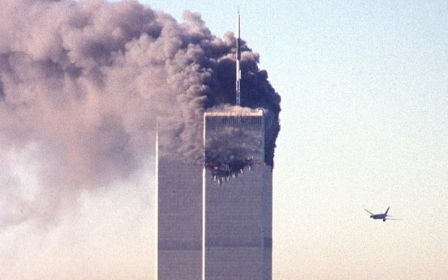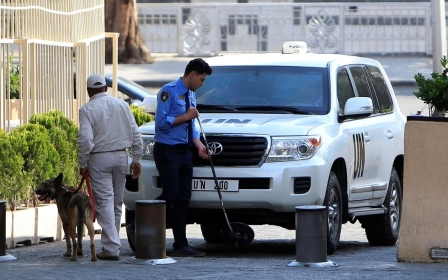Islamic State given two days to give up Damascus enclave

Islamic State (IS) group militants have been given 48 hours to agree to withdraw from an enclave they control south of Damascus, the pro-Syrian government newspaper al-Watan reported on Thursday.
"If they refuse, the army and supporting forces are ready to launch a military operation to end the presence of the organisation in the area," it said.
The militant-controlled enclave is centred around the Palestinian Yarmouk camp and the al-Hajar al-Aswad area south of Damascus. The area is much smaller than the eastern Ghouta region where the Syrian government recently defeated rebels.
A commander in the regional military alliance that backs the Syrian government said the Syrian army had begun shelling the IS enclave on Tuesday in preparation for an assault.
Yarmouk, some 8km from the centre of Damascus, was home to Syria's largest Palestinian refugee community before the Syrian war erupted in 2011.
Although most residents have fled, the United Nations has said several thousand remain.
The Syrian government has recovered swathes of territory from rebels by letting them leave to other rebel-held parts of the country after years of siege and ferocious military assaults backed by Russia and Iran.
Ghouta had been the opposition's main bastion outside Damascus, but government forces fully secured it after a blistering two-month assault that ended in negotiated rebel withdrawals.
The state news agency SANA reported on Tuesday that a deal had also been reached for rebels to quit Dumayr, a town further to the east, where a reconciliation agreement had kept a security status quo since 2016.
It said on Wednesday fighters from the Jaish al-Islam rebel faction were continuing to hand over their heavy and intermediate weapons in Dumayr ahead of their departure to the northern town of Jarabulus.
SANA said a total of 5,000 people including 1,500 rebels were expected to leave the town.
But the agreement appeared to be on the brink of turmoil by Wednesday evening, with Jaish al-Islam accusing pro-government forces of assassinating its interlocutor.
The group announced that Shaher Jumaa, whom it said was in talks with government ally Russia over the fate of Dumayr, was shot after a round of negotiations.
The Observatory confirmed Jumaa had been killed but did not identify a perpetrator.
Talks were ongoing for the nearby towns of Nasiriya and Jayrud to reach a similar agreement, according to the Observatory.
Shelling slammed into both of those towns on Wednesday, the monitor said, describing the bombardment as an effort by the government to pressure residents and rebels to agree to a withdrawal.
Meanwhile, the Pentagon said on Thursday that Syria's government remains able to conduct chemical attacks, though only at a limited level, following last week's international cruise missile strikes on chemical weapons-related targets.
General Kenneth McKenzie, director of the US military's Joint Staff, said Syrian President Bashar al-Assad's government retains a "residual" chemical capability at a variety of sites across the country.
"They will have the ability to conduct limited attacks in the future," McKenzie told Pentagon reporters.
"However as they contemplate the dynamics of conducting those attacks, they have to look over their shoulder and be worried that we are looking at them, and we will have the ability to strike them again should it be necessary."
The US has also said it has credible information that Russia and Syria are trying to "sanitize" the site of a suspected chemical weapons attack in Syria while denying access to the area by international inspectors.
State Department spokeswoman Heather Nauert said the team of inspectors from the Organisation for the Prohibition of Chemical Weapons (OPCW) had not been given access to the site of the alleged attack in the town of Douma on 7 April.
"We have credible information that indicates that Russian officials are working with the Syrian regime to deny and to delay these inspectors from gaining access to Douma," Nauert told a news briefing.
Stay informed with MEE's newsletters
Sign up to get the latest alerts, insights and analysis, starting with Turkey Unpacked
Middle East Eye delivers independent and unrivalled coverage and analysis of the Middle East, North Africa and beyond. To learn more about republishing this content and the associated fees, please fill out this form. More about MEE can be found here.




